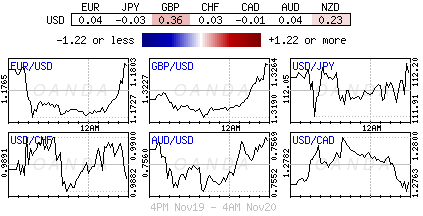Wednesday November 22: Five things the markets are talking about
The dollar is a tad weaker across the board after current Fed Chair Janet Yellen warned against rapid rate hikes, while the EUR (€1.1753) gained amid possible new moves to end Germany’s political impasse.
For Germany, options include new elections, but recent polls suggest that could result in another deadlock. Other possibilities are a minority government or an alternative coalition.
Note: There are rumors that Chancellor Merkel’s party is betting on a revived alliance with the Social Democrats to dodge the risk of new elections. So far, the ‘single’ unit is little concerned given the solid German and eurozone economic growth.
This morning’s U.K. budget could be a low-key affair for the pound (£1.3245), especially when compared with the U.K/E.U meeting this Friday. This meeting is likely to reveal whether Britain’s upgraded offer will unblock trade negotiations.
1. Stocks winning ways
Global stocks are adding to what’s been a stellar year for equity returns amid optimism about global growth and company earnings.
In Japan, the Nikkei share average rallied to a near two-week high overnight, supported by gains in large-cap stocks and financial companies as global growth hopes lifted the mood across world markets. The Nikkei ended +0.5% higher, the highest closing level since Nov. 10, while the broader Topix gained +0.3%.
Note: Japanese markets will be closed on Thursday for a national holiday.
Down-under, Australia’s S&P/ASX 200 Index rose +0.4%, while South Korea’s KOSPI index added +0.3%.
In Hong Kong, the Hang Seng index ended above the psychological +30,000 points for the first time in a decade, amid signs Chinese investors are stepping up buying of domestic stocks. The Hang Seng Index jumped +0.8%, while the China Enterprises index rose +0.71%.
In Europe, regional indices trade mostly higher in quite trade, with the exception of the DAX, which trades slightly lower, unlike the FTSE, which is a tad higher ahead of the U.K. budget today.
U.S. stocks are set to open in the ‘black’ (+0.1%).
Indices: Stoxx600 +0.1% at 388.4, FTSE +0.3% at 7432, DAX -0.2% at 13141, CAC-40 -0.1% at 5362, IBEX-35 +0.5% at 10038, FTSE MIB +0.3% at 22389, SMI +0.2% at XXX, S&P 500 Futures +0.1%
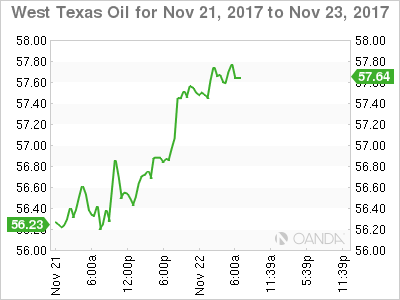
2. Oil spikes higher on Canada pipeline woe, gold steady
Ahead of the U.S open, oil prices have spiked with U.S. light crude hitting highs not seen in two-years after faults on a major pipeline dented Canadian deliveries to the U.S, where crude inventories were also reported to be falling.
U.S light crude (WTI) has hit a high of +$57.98 a barrel, up +91c overnight, while Brent crude is up +48c at +$63.05 per barrel.
The jump is due to an announcement that there has been an +85% cut in the amount of oil TransCanada Corp will deliver to the U.S on its Keystone pipeline through the end of Nov.
Also supporting prices is the fact that U.S crude stocks are also falling. API data in its weekly report yesterday showed that weekly stocks have dropped by -6.4m barrels in the week to Nov. 17.
Note: The latest official U.S production and inventory data is due later this morning (10:30 am EDT).
Outside of North America, markets have been supported by an effort led by the OPEC to end a global supply overhang by restraining output.
Gold prices are a tad firmer amid a mixed dollar, with investors remaining cautious ahead of the release of today’s FOMC minutes from the last policy meeting, which could offer hints on the outlook for the Fed’s monetary policy. Spot gold is up +0.2% at +$1,283.21 per ounce.
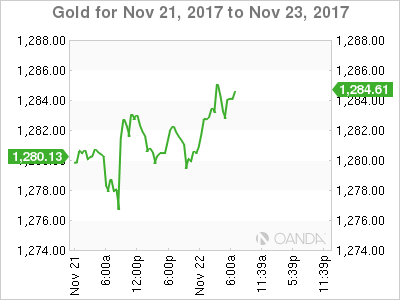
3. U.S. yield curves flatten further
The fixed income market has been showing that traders are more concerned that the U.S. economy may slow, with the spread between short and long dated securities tightening to its narrowest level in a decade (2/10’s spread is at +59 bps).
Note: U.S 2/10-years has narrowed -20 bps so far this month, and is at its tightest level since October 2007. The yield on 10-year Treasuries declined -1 bps to +2.35%.
Outgoing Fed chair Yellen has warned this week that tightening too quickly risked stranding inflation below the Fed’s desired +2% target. The market is waiting for the release of today’s FOMC minutes for more clues about the Fed’s policy path (2pm EDT).
Elsewhere, Germany’s 10-year Bund yield has advanced +1 bps to +0.36%, while in the U.K the 10-year Gilt yield has fallen -1 bps to +1.292%.
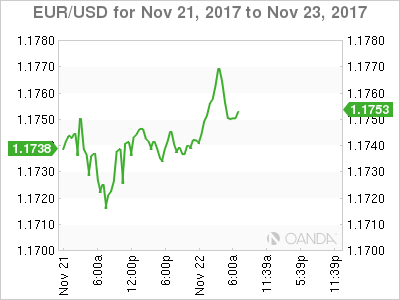
4. The ‘big’ dollar range trading
The EUR is +0.2% up against the U.S dollar at €1.1753 as improving eurozone growth takes precedent before political issues in Germany. Chancellor Merkel said she would rather have another election than form a minority government.
In the U.K, GBP/USD rises to its highest in nearly three weeks at £1.3268 – up +0.25% on the day – on reports that PM Theresa May is preparing to double her offer for a Brexit “divorce” settlement. Although this offer would still be below what the E.U has demanded, it raises some optimism among investors that Brexit talks may be able to progress toward discussing a trade deal and reason why it trumps today’s U.K budget.
USD/JPY (¥112.06) tested below the ¥112 level after UN Command official stated that North Korea violated Korean War armistice last week when it fired on defecting soldier at demilitarized zone.
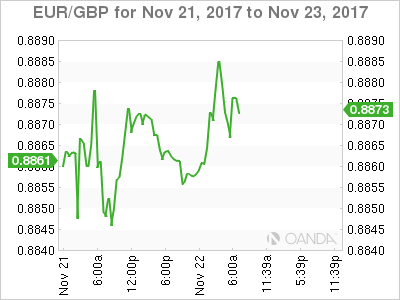
5. Fed minutes to give hints on officials’ mood ahead of final meeting
The Fed at its last meeting held short-term interest rates steady, but gave a more favorable assessment of the economy.
Today’s FOMC minutes (2 pm EST) should shed more light on officials’ views ahead of their final policy gathering in mid-Dec., when the central bank is expected to raise rates.
To date, officials have done little to dissuade high market expectations of a rate increase in a couple of weeks, so they might see no need for the minutes to send a strong signal about the timing of their next move.
Officials’ views on inflation will be crucial to their decision on whether to hike next month, as well as for the path of policy next year. Minutes from the Fed’s September meeting showed that lingering questions over inflation were driving a split among officials.
Yesterday, Ms. Yellen said she is “keeping an open mind” about inflation since “it may be that there is something more endemic or long-lasting here that we need to pay attention to.”
